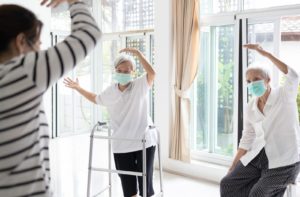Socialization has many benefits for your health and wellness, but many older adults live alone. Isolation can negatively affect seniors’ health, especially if they don’t see family or friends often.
Seniors living communities can help create social connections, offering positive effects to older adults’ physical and mental health, but what are the benefits of socialization? Continue reading to learn more about the 7 benefits of socialization for seniors.
7 Benefits of Senior Socialization
Many people don’t appreciate the value social connections bring to our lives. Socialization helps us create connections with the people around us. Spending time with family and friends are the main ways many socialize
Social connections are especially important for seniors; they provide several health benefits. If an older adult lives with family or near friends, there are many socialization options, but many seniors live alone. Thankfully, senior living communities offer older adults a way to socialize and cultivate new friendships.
These communities offer intimate interactions between neighbors, the formation of close friend groups, and enrichment opportunities. Senior living can help create a social community, providing many benefits, such as:
Reduced Stress
Socializing can become more difficult with age. Whether it’s a mobility issue or a lack of a consistent support system, isolated seniors have a higher risk of stress and other mental health concerns.
With a community of friends, many older adults have purpose, meaning, and a better mood. These benefits can help prevent the damaging effects of stress, such as mental health problems and cardiovascular disease.
Lower Risk of Mental Health Issues
Many adults feel lonely as they age; nearly 40% of Americans surveyed feel isolated. Loss of family and friends, chronic illness, hearing loss, and living alone are common reasons older adults are more susceptible to loneliness.
Isolation increases the risk of depression and mental decline, and many seniors living alone may suffer from poor mental health. Socialization can help prevent the effects of loneliness, and senior living communities offer many ways for older adults to create new social connections.
A Sense of Belonging
Many people search for a sense of belonging throughout their lives. It’s an essential feeling for older adults to have, and studies show a sense of belonging can help life feel meaningful. There are potential mental and physical health complications for people who lack meaning, such as:
- Poor physical health
- Poor mental health
- Lower cognitive function
Creating a social community can help older adults feel like they are a part of something bigger than themselves, cultivating a sense of belonging and improving mental health.

Frequent Exercise
A study discovered that older adults who socialize outside of their immediate family are more likely to exercise frequently. Continual exercise improves sleep, self-confidence, and brain function. Exercise can help seniors:
- Reduce the impact of illness or disease
- Improve mobility, flexibility, & balance
- Maintain or lose weight
Increased Cognitive Function
While crossword puzzles and other activities can help, keeping your mind sharp can be as simple as spending time with friends. Interacting with others trains your brain, and social contact can help improve memory retention. Positive social interactions can motivate older adults to learn more and use their minds more frequently.
Lower Risk of Mental Decline
Millions of Americans have Alzheimer’s, a form of dementia. The disease leads to severe cognitive decline, and many have trouble taking care of themselves. It may be surprising, but socialization can lower your risk of mental decline.
Strong friendships can have an impact on older adults’ cognitive abilities. Studies have found many seniors considered “very mentally sharp” have cultivated friendships with the people around them.
Episodic memory, your ability to recall specific memories in-depth, preserves when older adults socialize and maintain friendships. Study participants in their 80s had similar episodic memory compared to the significantly younger, middle-aged subjects.
Happiness
Spending time with friends and family increases happiness and quality of life. Someone doesn’t need to be a social butterfly to socialize; forming a close friendship and spending time with them can help bring new insights and perspectives.
Studies have found seniors who are socially active and prioritize social goals have higher satisfaction with life. Friendships can lower the risk of depression and anxiety..
Friendships and connections are more important than you think. Loneliness and isolation can bring many negative effects, but having a consistent support system can increase your quality of life. Senior living uses this idea to bring older adults together in a community of trust and support.
Supporting One Another Through Life
Senior living communities can offer many socialization benefits to older adults. Whether it be happiness, increased exercising, or improved mental health, having a supportive community can make a world of difference. If you’re interested in senior living for you or a loved one, contact your local community and see what options they provide.




